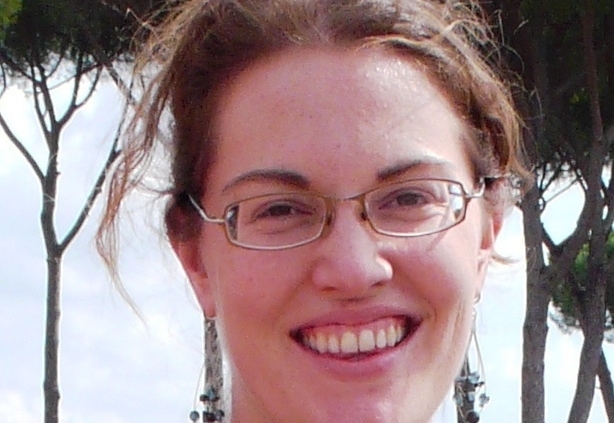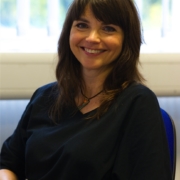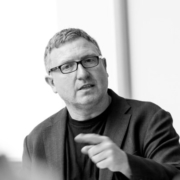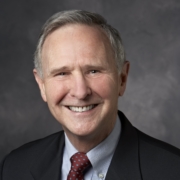Rwanda is perhaps most well-known for the genocide it experienced in the 1990s. In its post-conflict development, the country has had to balance colonial legacies, state centralizing tendencies, and the zeitgeist of neoliberalism. This has made for a careful balancing — one that has left the government regulating the society and economy while simultaneously reducing its responsibility to citizens.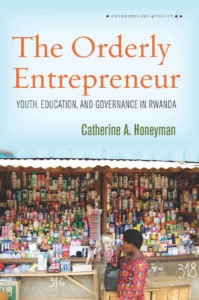
In education, this balancing act manifests in the government’s three aims: credentials, controls, and creativity. The education system is based on credentials awarded through examinations, a colonial hangover, and controls students as part of the state’s centralization efforts; yet, somehow, the system promotes creativity so students can pursue a learner-centered education tailored to their own needs, preparing them for the 21st century labor market of precarious work.
My guest today, Catherine Honeyman, has a new book that explores Rwanda’s opportunities, challenges, and paradoxes in post-conflict development through the policy of mandatory entrepreneurship education, which is believed to be the country’s beacon for economic growth. Catherine Honeyman is a visiting scholar at the Duke Center for International Development and Managing Director of Ishya Consulting. Her new book, The Orderly Entrepreneur, takes us inside both policy making circles and classrooms to understand part of Rwanda’s social transformation. The Orderly Entrepreneur received an honorable mention from the Globalization and Education SIG’s 2016 Book Award.
Citation: Honeyman, Catherine, A., interview with Will Brehm, FreshEd, 64, podcast audio, March 13, 2017. https://www.freshedpodcast.com/catherinehoneyman/
Transcript, translation, and resources:
Will Brehm2:00
Catherine Honeyman, welcome to FreshEd.
Catherine Honeyman2:03
Thanks, Will. It’s a pleasure to be here.
Will Brehm 2:05
So how did you first get involved in Rwanda?
Catherine Honeyman2:08
Actually, the first time that I traveled to Rwanda was 2002. I was there for a totally different project. I was studying Rwanda’s post conflict judicial system and I continued to go back for different projects and different reasons until I eventually settled there. So really, over the past 15 years, I’ve seen how Rwanda has transformed and it was already fairly stable when I arrived there. But you can really see how over this last decade and a half, it’s risen on the world stage. And in some, in some eyes, it’s seen as a model of post-conflict Reconstruction and Development, maybe not a perfect one, but one that many people are paying attention to.
Will Brehm 2:52
How did it transform, like over those 15 years? What are some of the main areas that you’ve seen change over those years?
Catherine Honeyman3:08
Well, I think around the time that I first traveled there is when the government was really getting its internal and border security situation under control. And when that was, of course, after the 1994 genocide against the Tutsi there was quite a lot of security issues that had to be dealt with, and many, many challenging issues in the region as well. And so, that first, I think, in terms of Rwanda’s recent history that first post-conflict stage was really occupied with just getting basic systems running again, including, to their credit, and pretty immediately the education system. But let’s say after 2002, 2004, really different creative projects started to be developed by the government, different policies, trying to learn from how other countries had developed, trying to seek out new strategies, including in the education system, also an economic system, and they developed many new strategies themselves, such as the judicial system that I studied initially.
Will Brehm4:20
So what sort of approach do you think the state of Rwanda has taken in its development in the post conflict period?
Catherine Honeyman4:31
Well, Rwanda has always had a centralizing government. It has a strong central government for, you know, at least 200 years. And that characteristic has, I would argue, stayed pretty similar throughout all the different regime changes. But at the same time, I think that post-genocide, there was really an interest in learning from the neoliberal era, which Rwanda is learning about that and attempt to apply some of those policies was cut short and disrupted by the genocide. And I think that as a new leadership came to power, they took both this strong central strong government approach to, at the same time looking at what are what has been gained through neoliberal policies, what is the current mode of thought about how to achieve economic growth, and they’ve been experimenting with how to put those two modes together.
Will Brehm5:40
So, what is the neo-liberal approach to governance in your opinion?
Catherine Honeyman5:47
Well, I think, of course, neoliberalism is associated with the free market, and in many places, it is associated with strong, strong government tendencies, some places authoritarian tendencies, but its overall ethos is about freedom, it’s about human freedom to choose on a market to compete for the best goods. And as an approach to governance, I think that it has a particular vision about the responsibility of governments towards citizens. It’s not a caretaker state, sort of, approach, it’s a everybody-fends-for-yourself, kind of approach, that feeling that people should be self-reliant, that they are capable of earning an income in the way that they can invent themselves, that the role of the government is to create this sort of overall enabling environment where certain basic rule of law is established, and that people are, are enabled to pursue the opportunities that they see.
Will Brehm6:53
On the surface, it sounds like this, the neo liberal approach would be at odds with a strong centralizing government that you said, is the legacy in Rwanda.
Catherine Honeyman7:04
Right, and I think not to center on the bottom on the global stage, we see those as opposing tendencies during the neoliberal, the strongest neoliberal era, there were the East Asian tigers, who were taking this completely different approach, which was much more state-centered, more about strategic economic planning, strong government role in society, as well as the economy. And I think just as an East Asia, many of those countries have now pivoted and tried to transform aspects of their social and economic policy towards neoliberalism, while retaining a strong central government role. This is exactly what Rwanda is now trying to emulate. So not to give up that position of the government as the leader and the guide and the regulator, not to give that up, but to infuse it with certain neoliberal ideas, especially neo-liberal ideas about the ideal citizen, the ideal citizen as an entrepreneurial person who follows the lead of the state, and yet also takes care of themselves doesn’t expect any handouts.
Will Brehm8:19
So, you talk, in your book, you talk about governance, in terms of processes of negotiated social learning? What do you mean by that?
Catherine Honeyman8:29
What I really mean is that looking at how social change and changes in governance are possible, even well, so much static and seems to carry through, our structures don’t change quickly. And yet, we do see change and we see governments that are actively trying to promote social and economic change. So, trying to understand that those two realities and how they fit together. I look at how our social world is made up of multiple social structures that overlap and within one another, and some overlap like a Venn diagram. But we all belong to multiple social groups. And these are communities of practice, we all are operating in the social world, and a government is operating in multiple communities of practice. At the same time, there’s an international field and there is also the social field that each member of a government, of a governing institution belongs to multiple fields at the same time, and we are learning among, in between them, all the time, we bring ideas from one social experience to another, and we go through processes, not of overt negotiation, but of more subtle adjustments to each other. Is this an appropriate thing to say in this context? this is my way of seeing the world, my docs might accept it, understanding of the world. Does anybody understand things the way that I do or when I speak, are they understanding something totally different? Do we speak a different language in terms of our basic view of the world?
The idea of negotiated social learning is to look at these multiple social structures, these multiple communities of practice that overlap from the international level down to the most local and personal levels, and how government is a practice that takes place within that structure. And there’s learning at all levels. So Rwandan leaders learn within an international field, they learn from a government like Singapore, and they learn from what attracts praise in the international field and what is criticized. But they also learn from their experiences, you know, some of them grew up in Rwanda and their parents lived through the colonial regime. Others were outside of Rwanda, some were trained as economists in western countries, some, you know, so there’s a great deal of diversity that Rwandan leaders bring to their governing and at the same time, when they enact a policy, it needs to negotiate and create meaning with the people who, interact with that policy, who themselves have, have so many different social experiences that they bring into their interpretation of the policy itself, whether or not they agree with it, and then how they how they choose to carry it out, often times not exactly how government imagined or intended.
Will Brehm11:50
So maybe to unpack what the negotiated social learning is, we can turn to your work on education in Rwanda, I guess, to start what is the role of education in post-conflict Rwanda?
Catherine Honeyman12:06
Well, in Rwanda I would say that there are three goals currently that the government hopes to achieve through their education system. And I doubted these have been explicitly stated. This is my analysis and my way of modeling more complex political policy realities. But I would say that here we’re looking the interest and importance of studying education policy and around it is that it is a microcosm of the challenges of this attempt to mix developmental or strong state ideals, such as what was done in East Asia, with neo-liberal ideals, and what I’ve called a and what others have called a post developmental state approach. So, in Rwanda, at the moment the education system as part of trying to move the population towards this post developmental ideal of a citizen. And so, the education system has taken on three major goals. One is to continue to promote order in the society to maintain controls, to be sure that there is a central authority that citizens respect that they’re aware of the laws and the regulations, and that they maintain an orderly conduct as citizens.
So, the education system, in fact, occupies itself with teaching children and students about laws, to some extent. There’s also the goal for the education system of promoting creativity, so not just controls, but creativity and here we have this neoliberal side coming in, it is also a constructivist and student-centered idea of education, which maps on to and fits well with neo-liberal ideas of greater freedom of choice, a greater sense that students need to be educated, to be self-reliant as they should be, they should take initiative, they should have creative thought. And this really is at odds with the initiative with the first goal, which is to promote control. So, in one sense, the teacher needs to maintain this authoritative role in the classroom in order to promote this idea of this state as a central authority. And at the other side, the teacher’s being asked to fundamentally transform their role on the classroom in order to promote more of a neo-liberal idea about individual initiative and the initiative of students.
And at the same time, of course, as I point out in the book, there’s a third factor, which is really a holdover from the colonial and perhaps even pre-colonial to some extent, but that’s a colonial education system. And that is that education’s purposes to award credentials. So, students are given a certain form of codified knowledge, which will be examined in a certain particular way. And their performance on that examination is tied to all sorts of social and economic benefits. So, we really have under this educational system, trying to do three things at once to promote creativity, to maintain controls, to award credentials, and those three often are in tension with one another.
Will Brehm15:33
Yeah, I mean, it’s interesting, so the credentials there’s a legacy from former era’s. There’s the need to have a strong state in perhaps post conflict contexts. And then also kind of the zaikai of the moment that the neo-liberal approach to education. So, all of these very contradictory ideas of education all get put in to one, to one Hall in a very, maybe contradictory way, but something that we as researchers have to hold on to and explore.
Catherine Honeyman16:07
Yes, and I think one of the reasons why I chose to research this topic, I found it valuable to publish it for a wider audience. Because this is not happening only in Rwanda, this is something you can see that many of the formerly developmental states are working to promote entrepreneurship now in their education systems, and have been for at least a decade and many other countries now are seeing those post developmental states in East Asia, the example of Rwanda and perhaps a few other places, and they’re considering now is that a model that can be followed in our own system. So, this is something that really has relevance beyond just Rwanda.
Will Brehm16:46
Yeah, and when I read your book, I was so I was surprised to be honest, that Rwanda was actively looking at Singapore as the model for its education system. Why Singapore?
Catherine Honeyman17:08
Well, I think Singapore has really this romantic shape. I mean, it was not a developed country, it was a small state, admittedly, an island with ports, which was not Rwandan context, but it was a small state and that it achieved this remarkable economic growth over such a short period of time. And I think at the same time, also, Singapore, in a way resonates with Rwanda because they appreciate orderliness, which was already a value in Rwanda. And it’s not the free for all laissez faire kind of idea that we see more promoted in the West. It’s a really a different approach to economics and society. So, I think that resonated with Rwanda and it’s also an inspirational example for Rwanda’s leaders. Of course, they understand it’s not simple, they’re not seeing it simplistically, as if Rwanda can just duplicate what Singapore has done. But they have actively sought out Singapore’s contribution, and their even consultancy as a form of development assistance, bringing technical consultancies from Singapore in a variety of fields.
Will Brehm18:23
So, you, in your book, you look specifically at entrepreneurship education in Rwanda, before we jump into that topic specifically, did Rwanda learn about entrepreneurship education from Singapore? Is that where the educational borrowing took place?
Catherine Honeyman18:41
No, in fact, as you may know, entrepreneurship education has or entrepreneurship initiatives for young people that has a long history in it. My reading of the history is this really comes out of the US business community initially and it’s you know, more than 100 years ago the establishment of programs like Junior Achievement, DECA and FBLA. But there were people looking at those models and economists who are attracted to these ideas. So really, those early experiences of entrepreneurship education were taken up and followed a little bit by people who were of the Austrian School of Economics and the neoliberal schools and there were some experiments in other countries and India and got taken up unnoticed by the World Bank by the ILO. So really briefly, in the book, I traced some of the intricacies of this the international spread of the idea of entrepreneurship education. And so, Rwanda, in fact, did not take this idea directly from Singapore and not to my knowledge. What I could trace was the presence of a German technical assistant had been teaching about entrepreneurship, but only in the technical schools for a while. And then organizations like the UN agency, UNIDO sponsored some trips, for example, to Uganda to see how Uganda was implementing entrepreneurship education. Although again, in a more limited setting, only as an elective course. And also, in my research, I found that there were key people within the government who had experiences, they had lived in a more neo-liberal influenced context. And they brought those ideas to some high-level meetings, saying, we really need more entrepreneurial students and more entrepreneurial graduates. Our graduates should not be searching for jobs, it should be job creators. This is the kind of mantra of the region.
So, when Rwanda adopted an entrepreneurship education program, it was not without history, but it is, I think, still almost unprecedented in the world that they agreed to which Rwanda adopted this policy. They adopted a policy that was compulsory for all students, and lower and upper secondary education. Lower secondary education, which is grades seven to nine in the US is all students of all backgrounds, theoretically, and aiming towards universal coverage. Upper secondary education, entrepreneurship education is compulsory in both the technical and vocational streams and the general academic streams. Whether you’re studying auto mechanics, whether you’re studying maths, physics and biology, or history or languages, you’re still taking entrepreneurship as a compulsory subject in Rwanda.
Will Brehm21:50
So, what does the curriculum for entrepreneurship actually look like?
Catherine Honeyman21:54
Well, it’s gone through different iterations. In the book, I discuss what happened during the first phase of development and the first implementation of this curriculum. And at that time, we’re looking at about 500 hours of course time over the course of six years. And what I found through my research was some a remarkable difference between the curriculum development process for the lower secondary cycle and the upper secondary cycle. So, one part of the book is looking at, why is it that in the lower secondary cycle, we find this really pretty drastic emphasis on laws and regulations. And then why at the A level, the upper secondary level do we suddenly find the curriculum swinging towards very learner-centered activities, and very creativity, promoting activities with really almost no discussion of laws and regulations, just a little bit about maybe personal ethical choices. So, we see really, the lower secondary, which is called O level, emphasizing really this controls side of the equation. And the upper secondary was emphasizing the creativity side of the equation at the time. Now, more recently, in 2014 and really fully implemented in 2016, there, there has been a curriculum revision that you can see is sort of swinging towards the medium, that the mean between those two drastically different approaches. Although it still emphasizes a significant degree learning about the legalities of entrepreneurship in Rwanda. So, this is one whole section of the book is devoted to my involvement in those curriculum development processes over the course of a full year and trying to understand how we arrived at such different outcomes at two different points in time, and for two different levels of the education system.
Will Brehm24:14
And what did you find?
Catherine Honeyman 24:16
What I found was that it was useful to use this framework of our participation in multiple communities of practice, and how we then bring different dispositions and different assumptions and different ways of thinking and behaving, we play them up in different contexts depending on what is relevant. And in the lower secondary, the development of the lower secondary education curriculum for entrepreneurship.
We had a much greater presence of people who had never studied outside of Rwanda and a strong emphasis, you know, the presence of people who knew the laws and a strong emphasis on, you know, what a young person really needs to know in order to start a business is which regulations to follow and which forms to fill out. And we need also knowledge that can be codified because we understand what the examinations are like. And students need to be able to reproduce certain concrete codified knowledge. Whereas a few months later, when we started to develop the upper secondary level curriculum, many things had changed. The language of instruction had changed from French to English, and that meant, different people participating in the curriculum development process. Those different people included some who had studied outside of Rwanda in highly neoliberal influenced countries as economists. So, they brought different ideas about what it is that an entrepreneur needs to know. And also, crucially, I found that the context, the discourse around examinations had begun to change. And there was a public discussion about how the examinations now needed to more strongly reflect the constructivist idea of knowledge, basically, that the young person needed to be able to produce their own ideas on the exam and not just repeat what they had been taught in class. So, both that all those changes really shaped things quite differently for the upper secondary level curriculum that same year.
Will Brehm26:33
Yeah, so entrepreneurship education, in a sense, kind of morphed as different ideas entered the policy space.
Catherine Honeyman26:43
Exactly.
Will Brehm26:44
And what about in the classroom space, though, what was going on when teachers had to teach entrepreneurship, and students had to learn entrepreneurship, what was going on there?
Catherine Honeyman26:55
Very interestingly, I was really, we could say, shocked when I first entered the classrooms. Because, we know, we began by, we spoke with students, and we also sat in on their classes for a full academic year, myself, and my research assistant Flora Mutimukeye. And we sat in on 11 classrooms for the full academic year. But what I saw from the beginning was that students did not respect this class, they treated it differently from their other subjects. And yet, in private, they were highly interested in becoming entrepreneurs, I could say that self-employment was their ideal if they could achieve that, by any means with, to have enough capital, and to work for themselves. That really that the high majority of them preferred the idea of self-employment. And they viewed business highly. So, we started the school year with this question in our minds, how is it that these young people are so interested in entrepreneurship, and yet completely uninterested in the class that is intended to teach them about entrepreneurship. And this is part three of the book is teasing out and trying to understand how that could occur.
Will Brehm28:15
And what did you find? I mean, that’s so interesting that that students would tell you that we love this sort of, we want to be self-employed, but at the same time, and we have to take entrepreneurship education classes, we disrespect it and we don’t like it. I mean, do you square that?
Catherine Honeyman28:33
Well, I don’t want to give away everything, since I hope some people will read the book. But we found what we found was really the students had a very different model in their minds about how one becomes an entrepreneur, very different from what the policymakers imagined. So, whereas the policymakers imagine that what comes first is information about entrepreneurship, and then that will cultivate entrepreneurs, attitudes, and aspirations. And then they will start up a business with whatever they have. And then they will increasingly earn capital and increase their business capital and grow their businesses. For students that was completely flipped around, they said, we can learn about entrepreneurship anywhere. But what we don’t have is the capital to start.
And I think without giving away all of the details, their perspective was valid, because in Rwandan contexts, you do need capital to start a business that is tolerated in the current regulatory environment. So this is not just your typical, maybe what we imagine as a developing country where you can do whatever you want on any street corner and make a few bucks, this is a place where it matters if you are registered and matters, if you have a fixed and formal place of business, if you’re on the street, you will be subject to police action, maybe not every day, but certainly predictably within the month. And, you know, so for young people, the they were aware that the avenue of starting with very little and growing didn’t fit the economic reality and the regulatory reality around them anymore. At the same time, I think that they see that the path to growth is very difficult for an entrepreneur who starts that way.
And so, what they much preferred was a classroom experience where they were very well prepared for examinations because their chance of eventually saving up their own capital dependent on performing well on those examinations and taking that traditional route to a higher earning job that would allow them to have capital.
Will Brehm31:07
So, it seems like entrepreneurship education very neatly, well, maybe not so neatly but can combine the paradoxes of creativity credentials and controls as being the three goals of the Rwandan education system. It seems like entrepreneurship education, can actually encapsulate all three of those paradoxical aims without, well, I don’t know, I mean, that’s what it seems like it’s doing, and it can, kind of, morph and change depending on who’s reading into it.
Catherine Honeyman31:44
Yes, I think that’s a valid point. And I think it’s not only a question of who’s reading into it, but really, it’s a question of finally, the target audience who are young people, they determine the meaning of the policy because they are deciding what to do with it in their own lives. And what I think we can really see in this case is that when there’s a mismatch between an education policy and the surrounding economic environment, or social environment, as the case may be, depending on the policy.
We, young people are pretty savvy. They’re not completely naive. They’re not just receiving the policy as it is and enacting it as policymakers imagine they’re reinventing it, they are in some cases contradicting rebelling against it in their own small or large ways, and they are deciding what to make of it in their own lives.
Will Brehm32:49
So, is it working? Are a lot of students becoming self-employed and utilizing some of the skills they’ve learned in entrepreneurship education. And once they hit labor market?
Catherine Honeyman33:01
That’s a great question. And I hope somebody will now do that study. Because this research, of course, it ended with a three-year tracer study of these students at the end of 2013, the follow up time to understand their perspectives and to interview some of them. So, what we can see is, you know, what happened in certain contexts, which is the schools in and around Kigali, some of them rural, some urban, but none of them distant from the capital.
So, in this reality, we see what happened over a certain period of time with really the most disadvantaged students were the ones that became entrepreneurs right away. And in many cases were already entrepreneurs just in order to go to school.
So, they weren’t in school to learn about entrepreneurship. They were entrepreneurs in order to get into school and pay their school fees or their materials.
So that dynamic during my research really didn’t look like it was changing, because the better connected and the wealthier students had options. They could wait, they could wait and earn more and save up capital and start a higher earning business that was more sustainable beyond just the survival level. And so, they were waiting for the most part, although they had many creative ideas, they were waiting. So, I think what we know right now about young people in Rwanda is that they value business and self-employment and entrepreneurship, it’s already through various means. It has already become a goal from for a large number of young people.
And perhaps this course’s even increasing that number because it exposes more young people to that idea. But what we don’t know yet as whether they’re learning anything of practical use for their businesses, especially in a context where they have this double bind, they have most young around them have very little capital. And yet very few things are feasible with little capital and environment where you have to be very formally registered. And so, with regard, your question was whether what are we seeing now, how is this working and practices is succeeding. And I think now that the curriculum is being transformed, and maybe we may or may not be seeing new forms of practice in the classroom as a result. It would be useful to look at whether some young people are especially learning enough to start a small-scale business that is legal but still matches the capital available. So, are they learning how to do that? And second, are they learning how to grow those businesses, because if the reality of most young people is an extremely low capital reality, then what entrepreneurship education could and should do, I guess, is to equip them with the skill and the knowledge to grow a business to understand how to gradually invest and find opportunities for growth, I’m not sure that the curriculum is yet capable of teaching that and in fact, on a global scale, I’m not sure to what extent most entrepreneurship education programs really equip young people with those skills. So that I think is a new territory in terms of those who are practically interested in implementing such policies. That’s a new territory to be investigated.
Will Brehm36:56
So, what are the main conclusions of your book?
Catherine Honeyman36:59
You know, there’re really two main conclusions from my book. The first is that post developmental states strategies which are aiming towards the economic development and the social development of their populations under a state-guided framework can, in fact, end up shutting out some of those who most need to benefit from that economic growth. And that is because they may shut out the lower capital opportunities for advancement that disadvantaged young people had under a less regulated economic framework.
And secondly, and this is connected, my book “The Orderly Entrepreneur” really drives the argument that education policies and economic policies that affect young people need to take into account the views and the experiences of young people, not as completely naive, inexperienced actors, but as often very insightful actors who are observing the realities of their families and the adults around them and who have lived within those realities for long enough to experience how they affect their own lives. And education policymakers need to take those views into account and take them seriously in order to design policies that really legitimately and effectively respond to the realities that disadvantaged young people face.
Will Brehm38:38
Right. It’s such a fascinating topic. Your book was an excellent read and I do highly recommend it to the listeners. And but it does sound like there’s a lot more work to be done on the topic. So, I guess you’ll have to come back on the show for your next book.
Well, Catherine Honeyman, thank you so much for joining FreshEd. It was really a pleasure to talk today.
Catherine Honeyman38:58
Thank you so much, Will. Pleasure to talk with you, too.
Have any useful resources related to this show? Please send them to info@freshedpodcast.com
Entrepreneurship Education in Rwanda

